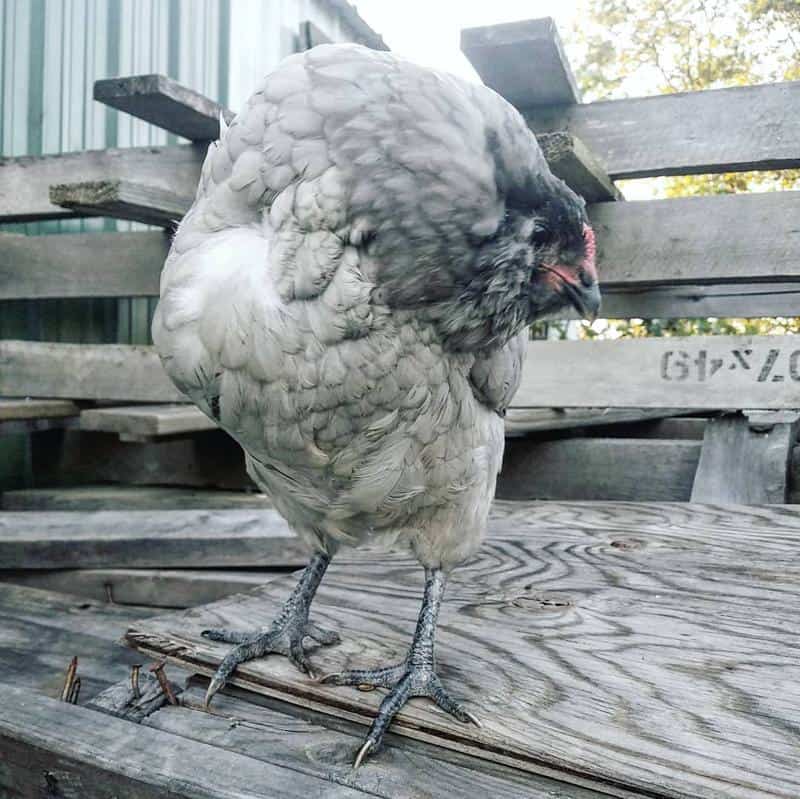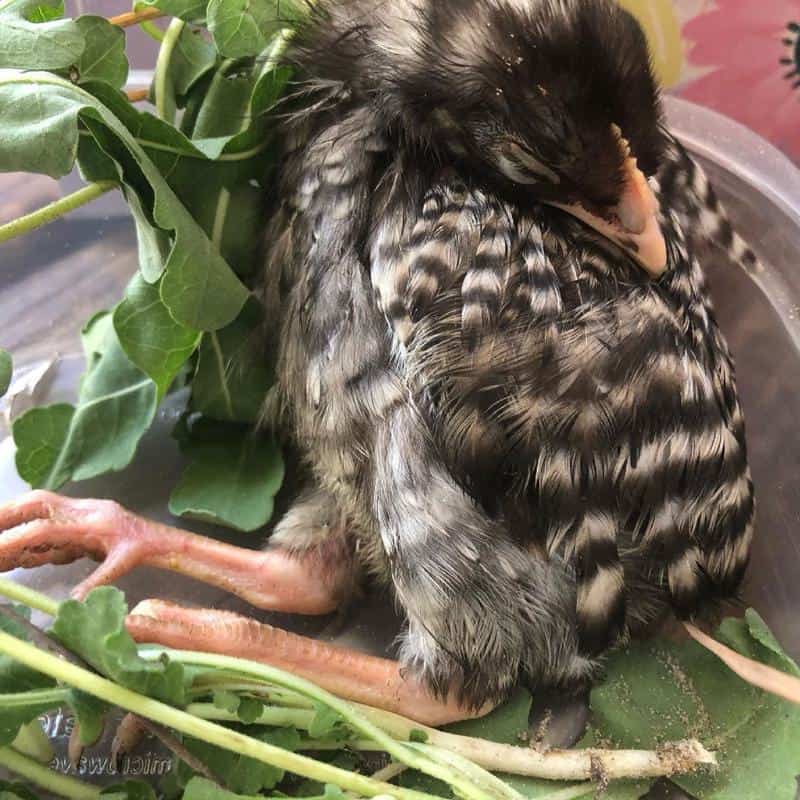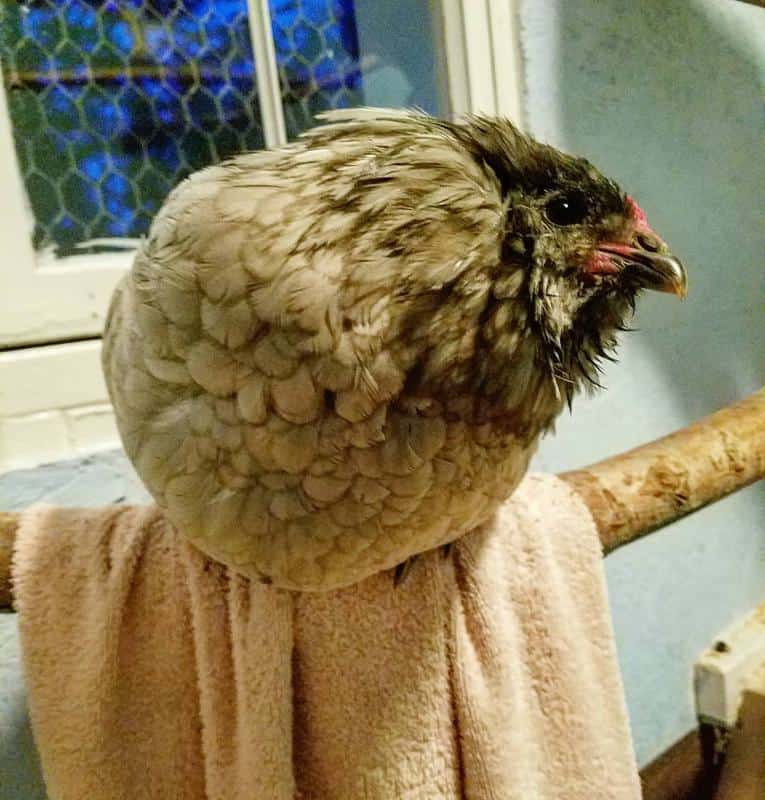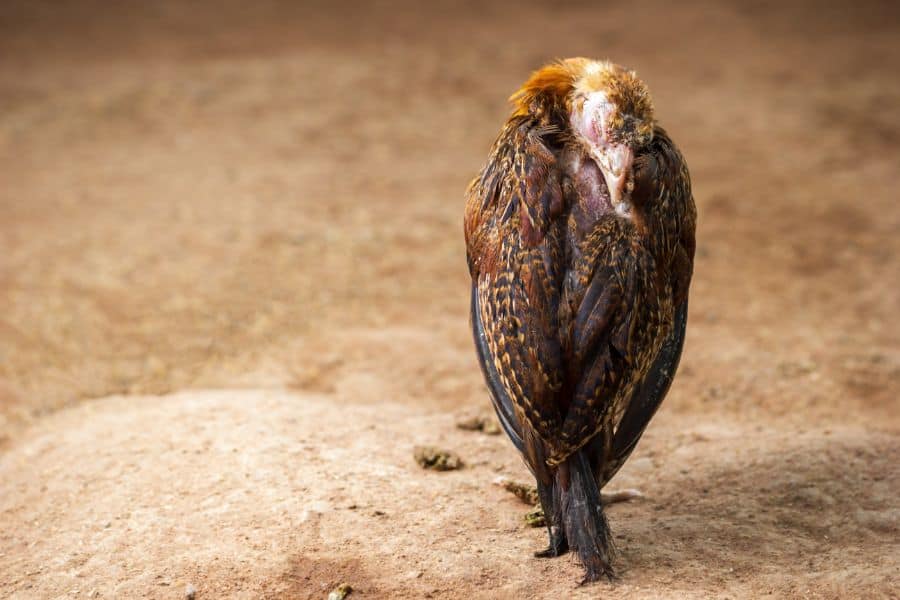It can be unsettling to enter your coop to find one of your chicks or chickens with its neck twisted oddly and its head stuck at an unnatural angle. This is what the condition known as wry neck or torticollis does to chickens.
Depending on the cause, wry neck in chickens may look more serious than it actually is. In some cases, the condition may even resolve on its own.
Although it’s not always serious, wry neck can also be an indicator of underlying problems that need to be addressed quickly.
Nutrient deficiencies regularly come up in the diagnosis of chickens with this condition but there are other more troubling causes of torticollis.
We dive deep into wry neck in chickens, examining its causes, treatment, and what you can do to prevent it.
What Exactly is Wry Neck?

Wry neck is not a medical condition, it is a symptom of some other underlying condition. It presents itself in several ways including:
- Head tucked between the legs of the chicken.
- Chicken’s head is tilted sideways.
- Chicken’s head is upside down with the neck twisted 180 degrees.
- Chicken’s neck pointed downwards and curved to the side.
- The head and the neck are stretched over the chicken’s back leaving its beak pointed upwards.
Wry neck goes by other names in farming circles including crook neck, stargazing, limber neck, and twisted neck. However, the medical term for this problem is Torticollis.
Effects of Wry Neck
Regardless of the cause, a chicken exhibiting wry neck will encounter several challenges including:
- Difficulty in feeding and drinking water.
- Difficulty in moving around since they can’t see their surroundings properly.
- Bullying from other flock members due to their condition.
Drinking water may be more challenging than eating for chickens with wry necks since they need to turn their heads up to drink. This was the case for the chicken in the video below.
Causes of Wry Neck in Chickens
There are many issues that can lead up to wry neck in chickens. These include:
- Diseases
- Nutrient deficiencies
- Head injuries
- Toxins
- Genetic problems
Diseases
There are several diseases whose symptoms may include wry neck. These include:
- Marek’s disease
- Newcastle disease
- Fowl Cholera
- Toxoplasmosis
- Dactylariosis
Some of these diseases are highly contagious and may put your entire flock at risk. Mareks disease, Newcastle disease, and Fowl Cholera, for instance, can spread rapidly through your flock.
If one of your chickens is exhibiting wry neck, it’s a good idea to isolate it until highly contagious diseases have been eliminated as possible causes.
Nutrient Deficiencies
Diet problems are usually the main suspect when a chicken has wry neck. Many farmers have found insufficient levels of Vitamin E and selenium to be behind this problem in their birds.
Muscle and nerve cells can undergo oxidative stress because of metabolism. Vitamin E and Selenium are antioxidants, and they help to protect these cells from this stress.
When these two antioxidants are lacking, the nerves can become damaged and the muscles weak.
Vitamin B1 and B12 deficiencies can also result in wry neck in chickens. Either deficiency can affect the brain and nerve tissues resulting in Torticollis.
Such nutrient deficiencies are common when backyard farmers prepare their own homemade feeds and fail to add the correct amounts of nutrients. However, even farmers who feed their chickens commercial feed still face this issue on occasion.
Reputable feed companies will ensure that their feed has the right quantities of vitamins and minerals. However, moisture, heat, and light can cause them to degrade and lose their potency.
Head Injuries
A head injury can also cause wry neck in chickens. Head injuries can be the result of a blow to your chicken’s head such as when pecked by another chicken.
Head injuries are a serious concern in crested breeds such as the Silkie and the Polish. These crested chickens tend to have vaulted skulls which don’t always protect the brain adequately.
A vaulted skull may have holes that leave the brain exposed to the pecks of other chickens. Some birds will have the entire top of their skulls missing and even bumping their heads accidentally can lead to neurological problems.
Injuries to the brain can lead to various complications of which wry neck will just be one symptom.
Toxins
Botulinum toxins are the toxins that cause botulism in chickens and humans. The spores that carry the bacteria that produce these toxins can be found in spoiled feed, untreated water, rotting matter, and even in soil.
One of the effects of botulism is wry neck in chickens.
Another toxin that can cause wry neck in chickens is the T-2 Mycotoxin. This mycotoxin is produced by mold which can grow on various grains including oats, barley, and wheat.
Aflatoxin B1 can also cause nervous system issues including wry neck in chicken. Aflatoxin B1 is produced by the fungi Aspergillus flavus and Aspergillus parasiticus and is commonly found in animal feeds that are stored in the wrong conditions.
Possible Genetic Problems
Some chicks are afflicted by a form of wry neck right from the beginning. This condition is known as Congenital loco and usually results in death as the chick is unable to eat.
A similar condition can occur a few days after hatching but only lasts a few days before resolving on its own. Chicks with this second condition usually survive.
These conditions are not yet well-understood, but in the case of congenital loco, a recessive genetic trait is known to be behind the issue.
Treatment of Wry Neck in Chickens

Due to the many possible causes of wry neck, treatment usually requires diagnosis and resolution of the underlying problem.
Disease-Caused Wry Neck
Treating some of the diseases whose symptoms include wry neck can be challenging. Diseases like Newcastle and Mareks can have a mortality of up to 100% if your flock is not vaccinated.
There are vaccines to protect chickens against these diseases but no cure. It should be noted that when the Marek’s vaccine is improperly administered, it can also result in wry neck.
Nutrient Deficiencies
Dietary issues seem to be one of the main causes of wry neck but, luckily, the mortality rate in such cases is quite low. The treatment usually involves:
- Isolating the affected chicken to keep it from getting picked on.
- Administering supplemental nutrients.
It is difficult to identify which nutrients are lacking in the chicken. Therefore, a good approach to treatment is to supplement all nutrients that are likely to be deficient.
Depending on the severity of the condition, you may need to assist your chicken to eat and drink as it recovers. With dietary issues, you may only have to do this for a few days before it can eat and drink on its own again.
Caution should be exercised when feeding chickens with this condition as it may make it harder for them to swallow.
Head Injuries
Treatment of wry neck caused by a head injury isn’t always possible depending on the extent of the injury. This is best established by your vet.
An anti-inflammatory drug can help the brain swelling to go down. If the bird recovers from the injury, symptoms such as wry neck should go away.
Toxins
The treatment administered will depend on the specific toxin that is affecting the chicken. In some cases, there is no specific treatment, and affected birds are likely to die.
However, if your chickens only ingested a small amount of the toxin, it could wear off in a few days.
How Long Does It Take to Cure Wry Neck in Chickens?
In the case of wry neck caused by a nutrient deficiency, you may start to see positive results as early as 24 hours after the start of treatment. However, it could take as many as four weeks for the issue to be fully resolved.
It’s recommended that the treatment is continued for two more weeks after the symptoms have stopped showing.
In wry neck caused by other conditions, timelines are uncertain, and recovery may not even be possible.
Can Wry Neck Kill a Chicken?

There are two ways that a chicken with wry neck could end up dead. These are:
- The chicken could be killed by the underlying condition.
- The chicken could starve to death or die due to dehydration if the wry neck makes it impossible for it to eat or drink.
If it’s suspected that the wry neck is caused by a disease that can be spread to others, or if a vet determines the prognosis is not good, the chicken may need to be culled.
Also Read: Humane Ways to Euthanize a Chicken
Prevention of Wry Neck in Chickens
There are several steps you can take to ensure your chickens are unlikely to be afflicted by wry neck. You should:
- Ensure all your chicks receive vaccinations against Newcastle, Marek’s, and any other disease they are likely to be exposed to.
- Have enhanced biosecurity measures in place to limit the introduction of bacteria and viruses to your flock.
- Get your feed from a reputable manufacturer and confirm it has all the essential nutrients for your chickens.
- Store your feed under the right conditions and don’t use feed that has been stored for too long or is past its use-by date. The chicken feed should never get wet.
- Inspect your yard for plants that may be toxic to your chickens.
- Clear any rotting fruits and vegetables from your backyard to keep chickens from eating them.
- Keep your chickens from drinking water from unsanitary or stagnant sources.
- Take measures to prevent the development of mold in the chickens’ environment such as proper ventilation.
Due to the danger of getting chicks with congenital issues that result in wry neck, you should also source your eggs from reputable breeders only.
Chicken breeds with crests are at a higher risk of suffering brain injuries that result in torticollis. These chickens should not be placed in flocks where they are likely to suffer pecking from other birds.
Also Read:
Final Thoughts
As shocking as wry neck in chickens looks, it’s not the issue you should be concerned about. The underlying condition that caused the wry neck is the real concern and unfortunately, there are many suspects.
A nutrient deficiency is usually the cause according to many farmers who have encountered this issue. This is also the best-case scenario because it is very treatable.
In other cases, wry neck can be caused by diseases, head injuries, toxins, and possibly, genetic issues. Although treatment may work in some of these cases, there is often no cure, and prevention of these issues is what is recommended.
Chickens with wry neck caused by nutrient deficiencies recover quickly and should be fine in less than a month. You may have to help your bird to eat or drink for a few days depending on how severe its condition is.

